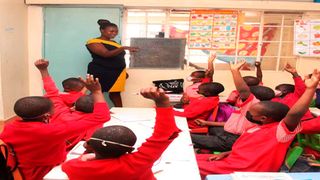
Pupils at Shine Academy with their teacher Winnie Ajela in Kibera, Nairobi, on May 31 | 2021.
| Lucy Wanjiru | Nation Media GroupEducation
Premium
It's back to school or de-listing for CBC teachers
Teachers taking learners through the new Competency Based Curriculum (CBC) will be required to go back to school every five years for refresher courses or risk losing their teaching licences.
The Teachers Service Commission (TSC) yesterday rolled out the Teacher Professional Development programme (TPD) and signed contracts with four universities that it has selected to offer the in-service training to the tutors.
TSC chief executive officer Nancy Macharia said the training will align the profession to global trends.
Teachers will be required to undertake the refresher modules at their cost every five years to be recertified. “The Teachers will be required to renew their teaching licence every five years after the completion of each module,” said Ms Macharia. She was speaking during launch of the TPD programme at the Centre for Mathematics, Science and Technology Education in Africa.
The TPD programme is anchored in the Career Progressive Guidelines (CPG) that were at the centre of the bitter dispute with the former leadership of the Kenya National Union of Teachers (Knut). Teachers will be required to undertake six modules, each of them within the space of five years.
It means that to complete the six modules, it will take a teacher 30 years. Ms Macharia said the years for each module cannot be shortened, as they were developed by professionals.
“Over the years, the teaching profession has received a lot of criticism, secondary school teachers are termed as semi-skilled while our primary school teachers are accused of being unskilled. This is why this programme is important as it will progressively retool our teachers,” she said.
Ms Macharia said the commission aims to ensure that the teaching profession is aligned to other professions such as law, engineering and medicine where students do professional courses to get and renew their licences.
The four universities that signed contracts with the TSC to train teachers are Mount Kenya University, Kenyatta University, Riara University and the Kenya Education Management Institute (Kemi).
According to the contracts, teachers will pay a Sh6,000 training fee annually which will be inclusive of all the training sessions, assessment, reporting and other associated costs incurred.
To complete one module, a teacher will be required to pay Sh30,000 within a period of five years, which translates to Sh180,000 for six modules over the course of 30 years.
“The service provider will be wholly responsible for collection of the fee directly from the teachers and the commission will not be accountable for the non-payment of fees by any of the teachers or instructional leaders,” reads the contracts.
The universities will also be required to issue certificates to teachers who go through the programmes.
Ms Macharia termed the programme as “affordable” for all teachers and asked those in the employment of TSC and unemployed teachers to identify and register with one of the contracted universities.
The TSC and the four universities agreed that the methodology of offering the modules will take a minimum of 42.5 hours of professional development consisting of five face-to-face sessions, two online sessions and blended learning.
All the sessions will be carried out during the school holidays. The face-to-face sessions will be for a minimum of 40 hours per week and will be undertaken at all sub-county training centres across the country.
TSC also requires the four universities to carry out psychometric tests to identify the unique competency gaps that each teacher requires.
The vice chancellors of Mt Kenya University (Prof Deogratious Jaganyi), Kenyatta University (Prof Paul Wainaina), Riara University (Prof Robert Gateru) and Kemi (Dr Maurice Odondo) who were present to sign the contracts assured teachers that they have set all the relevant infrastructure to offer the six modules.
Also present were secretary generals of three teachers unions, Collins Oyuu of Knut, Akelo Misori of the Kenya Union of Post Primary Teachers (Kuppet), and James Torome of the Kenya Union of Special Needs Education Teachers (Kusnet).
The Kenya Primary Schools Heads Association (Kepsha) and Kenya Secondary Schools Heads Association (Kessha) officials also supported the roll out of the TPD.
Kepsha chair Johnstone Nzioka said the programme was long overdue, and would help to “professionalise” teaching.
“We are in support of it and I call upon all teachers to start enrolling,” said Mr Nzioka.
The TPD modules were developed in 2018 through the Commission’s policy paper which proposed that teachers undergo continuous professional training.
According to TSC, the programme is meant to address the performance gaps identified through the Teacher Performance Appraisal and Development (TPAD) tool.
It will also facilitate career progression of teachers and will be used for recertification of all teachers to ensure professional compliance.
“So far, the teaching service has improved since we introduced Tpad as we have reduced absenteeism of our teachers, the remaining gaps will be addressed through the TPDs,” Ms Macharia said.
TSC had planned to roll out the programme in 2018 after developing a framework. However, the plan was halted after the former secretary general of Knut, Wilson Sossion, moved to court arguing that the employer should pay for any programme that they want teachers to engage in.
The case dragged in court for close to three years since 2019. After Mr Sossion resigned and a new leadership was elected, the union withdrew all the cases against TSC and pledged to restore cordial relations with the employer
Ms Macharia said the Commission will set up a committee to address all issues affecting teachers.





